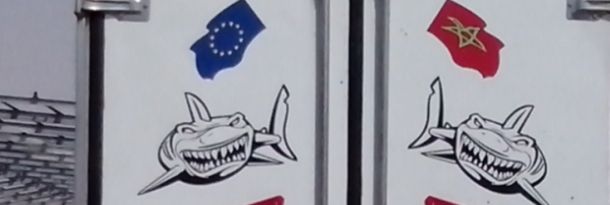
Morocco is spending most of the funding it receives as part of the EU-Morocco fish deal building up infrastructure in occupied Western Sahara. And the European Commission is fully aware of this.
Out of the 25 projects receiving funding support from the EU, only 4 are being carried out in Morocco proper. The remaining 21 projects are either exclusively or in part carried out in occupied Western Sahara. This is clear from a report Morocco sent to the European Commission six months ago, which outlines how it is spending the so-called fisheries sectoral support. A summary of the projects is included below. WSRW has received a copy of the report, download it here.
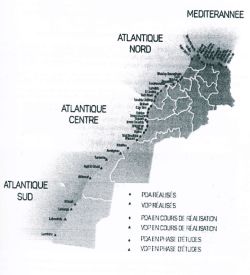
In the report, Morocco does not distinguish between its own territory and that of Western Sahara. Maps such as the one shown right - this particular one depicting fishermen towns in "Morocco" - are used throughout the report and exemplify how Morocco is not capable of seeing Western Sahara for what it is; not Morocco. As a result, it is impossible to know exactly how much Morocco is spending in the territory it holds under military occupation. This is especially the case for projects that are simultaneously carried out in both Morocco and Western Sahara under the same description; the report contains no details about how much of the budgeted or spent support is earmarked for which territory.
But the general picture is clear; most EU-accorded fisheries sectoral support is being used for building infrastructure on occupied land. And the European Commission has explicitly stated its approval.
How did that come about? Let's recap.
Why is Morocco receiving money to develop its fishing sector?
Under the current Protocol to the Fisheries Partnership Agreement, the EU pays Morocco an annual €40 million. About €10 million thereof is paid by the fishing industry. The remaining €30 million is paid by the European tax payer, and is earmarked for two different purposes; €16 million is paid to Morocco to allow the EU fleet access to the waters of Morocco, the remaining €14 million is given as sectoral support. That money can be used by the Moroccan government to fund projects to further develop the fishing sector in Morocco. This is viewed as part of development support granted to the countries within the EU's so-called neighbourhood area.
How does that relate to Western Sahara?
A former Spanish colony, Western Sahara was invaded by Morocco in 1975 - blatantly ignoring the Advisory Opinion of the International Court of Justice which found that Morocco had no basis for any claim to the territory of Western Sahara, underscoring that the people of the territory, the Saharawis, have the right of self-determination; the right to determine their status and that of their territory.
Western Sahara is considered a Non-Self-Governing Territory by the United Nations, a colony awaiting the process of self-determination. Western Sahara is the only out of the 17 Non-Self-Governing Territories that has no administering power appointed to it by the UN. It is worth noting that the Spanish High Court, the Audiencia Nacional, in July 2014 affirmed that Spain is still the administering power over Western Sahara, and that it still has obligations with regard to the territory until decolonisation has been completed. No State in the world has recognised Morocco's self-proclaimed sovereignty over Western Sahara, and the Saharawi people's right to self-determination has been universally acknowledged.
Western Sahara is thus not part of Morocco, and Morocco has no legal title over the territory. This was recently confirmed by the Court of Justice of the European Union, which in its 10 December 2015 Judgment - annulling the EU-Morocco agricultural agreement as it was applied in Western Sahara - stated that Morocco had no mandate whatsoever to administer Western Sahara (T‑512/12, §233 and &241). Nevertheless, to date Morocco continues to occupy three quarters of Western Sahara and sell off the territory's natural resources, including the rich fish stocks, as its own.
Morocco's issuing of fish licences in the territory under occupation dates back to the annexation itself, of the autumn of 1975. The collapsing Franco regime, failing to decolonise the territory by allowing it to be annexed by Mauritania and Morocco, made sure to sign an agreement with Rabat so that Spain would continue its fisheries practices even though the territory would be under occupation. In 1986, Spain joined the EU, and from 1988, the EU started paying the Moroccan government funds to allow Spanish vessels to catch fish in the territory. The EU fisheries practice in Western Sahara is thus directly linked to the history as of why the territory was illegally annexed in the first place.
Why does the EU fish in Western Sahara's waters, if those waters are not part of Morocco?
As the EU is unwilling to stipulate that the fisheries deal with Morocco only applies to the territory of Morocco as that territory is accepted by the international community, Morocco was left to define its own territorial extent. And that interpretation differs manifestly from everyone else's. It includes almost all of the coastal waters of Western Sahara. As a result, EU-flagged vessels operating under the agreement with Morocco fish in the waters of Western Sahara.
Does Morocco have a right to sell off Western Sahara's resources?
GENEVA CONVENTIONS
On 26 June 2015, the Saharawi's political representative Polisario signed up to the 1949 Geneva Conventions, leaving little doubt that Morocco's status over Western Sahara qualifies as an occupying power. Morocco's status over Western Sahara is that of an occupying power.
Accordingly, international humanitarian law, and specifically the law of occupation, applies. According to the International Court of Justice, international humanitarian law is applicable irrespective of the “precise status” of the occupied territory. When is found to be applicable, international humanitarian law governs exclusively the exploitation of natural resources by the occupying power.
Morocco cannot give concessions with regard to Western Sahara's resources for its own benefit or to grant concessions over the natural resources of the occupied territory. Irrespective of the fact that Morocco is the occupying power of Western Sahara, exploitation of the natural resources of Western Sahara must at least respect the applicable law to non-self-governing territories. Therefore, Morocco is obligated to ensure that resource-related development in Western Sahara is undertaken in accordance to the wishes and interests of the people of the territory, so as not to prejudice the situation after the occupation has ended. This was confirmed by a UN Legal Opinion for the Security Council in 2002.
There is no indication that any economic activity in Western Sahara, including the EU fisheries, has benefitted of the Saharawi people and has been done in accordance with their wishes. All available evidence points to the opposite. The Saharawi people has consistently and expressly spoken out against Morocco's exploitation of their resources, and against the EU for engaging in agreements that pertain to Western Sahara.
Is it acceptable for the EU to fish in Western Sahara under a deal with Morocco?
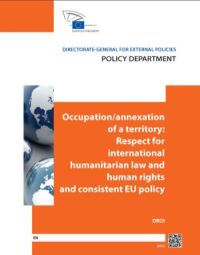
As an occupying power, Morocco has no competence to enter into agreements regarding Western Sahara's natural resources.
Under international law, "all States are under an obligation not to recognise an illegal situation resulting from annexation. They are also under an obligation not to render aid or assistance in maintaining this illegal situation. It is also for States, while respecting the United Nations Charter and international law, to see to it that any impediment, resulting from the annexation, to the exercise by the people of Western Sahara of its right to self-determination is brought to an end", a 2015 report of the European Parliament's Policy Department reads.
That same parliamentary analysis concluded that "any agreement with Morocco regarding the waters and territory properly belonging to Western Sahara should be the subject of an arrangement, in which Morocco acts in capacity of an occupying power. As additional conditions, it should be clear that the agreement would benefit the people of Western Sahara (as defined under international law) and be in accordance with the wishes of that people".
The author of the UN Legal Opinion of 2002 on exploration and exploitation of Western Sahara's mineral resources, Dr. Hans Corell, has frequently spoken out against the EU-Morocco fisheries agreement. "Under all circumstances, I would have thought that it was obvious that an agreement of this kind that does not make a distinction between the waters adjacent to Western Sahara, and the waters adjacent to the territory of Morocco, would violate international law", Corell stated with regard to the EU-Morocco fish deal.
Why is the EU not addressing this obvious violation of international law?
Some EU Member States, in particular Spain, have a huge vested interest in maintaining access to Moroccan and Western Saharan waters. Spain, and its massive fishing sector, have been the driving force behind successive EU-Morocco fish deals. In addition, there is strong political pressure from France, Morocco's most loyal ally in the EU, not to upset the relations with Morocco by even mentioning Western Sahara.
When, in 2011, the European Parliament rejected the previous EU-Morocco fisheries protocol with Morocco, partly out of concerns over international law, the European Commission came up with a two-fold remedy; first, Morocco was required to report annually on the geographical distribution of the social and economic impact of projects carried out with the financial contribution it receives as part of the fisheries deal. Second, the Protocol could be suspended in case of human rights violations.
Yet this remedy is merely cosmetic, as neither of these provisions does anything to ensure the EU's exploitation of Western Sahara's fish stocks is carried out with a benefit to and in accordance with the wishes of the Saharawi people.
International, independent human rights monitoring is absent from the occupied area of Western Sahara. The UN peace keeping operation is prevented from doing so by Morocco, and Morocco has refused international associations like Amnesty International and Human Rights Watch access to the territory. Numerous resolutions from the European Parliament express concern over human rights violations committed against the Saharawi people. It is unclear which agencies the EU would rely on for assessing the violations of human rights in the territory in order to give meaning to the new Protocol's suspension mechanism.
Is the EU aware that it is funding Moroccan projects in occupied Western Sahara?
The Protocol specifies that the programing of the sectoral support falls under the remit of a so-called Joint-Committee, constituted of representatives from the European Union and the Kingdom of Morocco. Procedure dictates the Moroccan government must present the projects it would consider eligible for EU sectoral support within this framework. The EU Commission then needs to expressly agree to fund these projects in arrears; once granted EU approval, Morocco can proceed with the implementation of the projects, and the EU refunds one year down the line, in accordance with project completion.
The current Protocol entered into force on 15 July 2014. On 4 and 5 September of that year, the Joint-Committee approved the programing and monitoring of projects, before such projects would be financed as sectoral support. For the first year of the Protocol, the parties agreed to 25 projects for a total amount of the available sectoral support; €14 million. These 25 projects are mainly infrastructural work, aquaculture, fisheries research and material support.
In October 2014, the European Union transferred the full amount of €30 million to the Moroccan government – the total sum for access to the waters and for sectoral support.
What did the EU fund?
In October 2015, Morocco provided the European Commission with a report outlining the implementation of the agreed projects. According to that report, around 63% of the sectoral support was spent on infrastructure projects, 24,3% went to material purchases, just under 10% was spent on research projects, and the remaining 2,5% was classified as “other projects”.
The money for these projects in handled by three Moroccan institutions, depending on the content of the projects. The National Institute for Fisheries Research (INRH) received 19% of the total amount, the National Agency for the Development of Aquaculture (ANDA) received 1%, while the remaining 80% was given to the National Office for Fisheries (ONP).
How much of that EU sectoral support is Morocco spending in occupied Western Sahara?
Out of the 25 projects, 11 are located in Western Sahara. In addition, 10 other projects are to be carried out partly in Western Sahara. Only 4 out of the 25 projects which Morocco received funds for are clearly taking place in Morocco.
Nearly half of the sectoral support granted by the EU, is being spent on projects that are exclusively carried out in Western Sahara. Out of the 154,7 million Moroccan Dirham (corresponding to €14 million) that Morocco reports about as having spent in the first year of the Protocol, over 71 million Moroccan Dirham (MD) was spent exclusively in Western Sahara - or €6,43 million. Another 24,5 million MD (€2,22 million) is spent on projects that are located in Morocco proper - barely around 16% of the sectoral support.
About 59 million MD (€5,35 million) has been allocated for projects undertaken in both Morocco and Western Sahara under the same project description. With regard to these projects, it is impossible to decipher how much money is being allocated where. However, the descriptions (see below) of several such projects spell out that most of the work will be undertaken in towns located in Western Sahara. This, combined with the fact that nearly half of the EU sectoral support was spent on projects entirely in Western Sahara, leads to an unambiguous conclusion that most of the money is being poured into Western Sahara - over which Morocco has no sovereignty or international mandate to administer the territory.
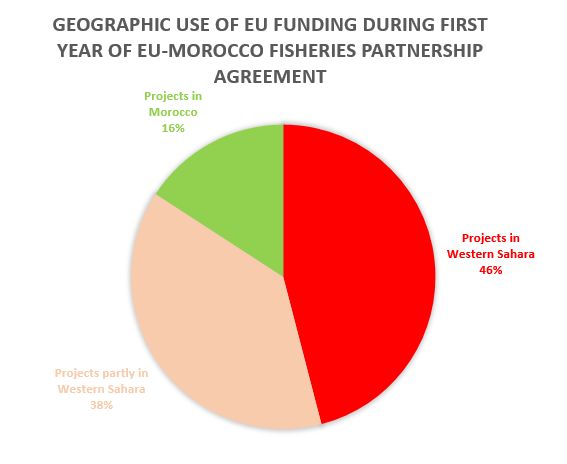
What is Morocco doing with that EU fish sector support money in Western Sahara?
There is one project which is located precisely on the border of Morocco and Western Sahara, in the fishing town of Amégriou. With EU funding, the Moroccan government wants to construct a fish hall here that is worth 3MDH (€272,000). One third of that estimated amount has been spent during the first year of the EU-Morocco fisheries protocol. WSRW has located the project site as just north of the border.The projects described below are all carried out by the Moroccan government inside occupied Western Sahara with EU fisheries sectoral support. The first 10 projects (1-10) are undertaken exclusively in the territory of Western Sahara, while the other 10 (11-20) are carried out only partly in Western Sahara.
Of the latter category, some project descriptions specify which port cities fall within the scope of the project. Other projects in that same category cover more general research or material investments, which presumably would be applied to both Morocco and Western Sahara - as the Moroccan government considers that it has sovereignty over Western Sahara.
1. Construction of the “new generation” freezing hall in Dakhla
Due to the increase in landings in Dakhla, the port requires the establishment of a suitable market infrastructure, Morocco’s report to the Commission declares. The existing hall in down-town Dakhla can’t cope with the increased volumes and doesn’t allow for the fish to be preserved well. A new, state-of-the-art freezing hall located in the port’s premises would tackle that. This hall would include a market place for fish to be sold, three icing factories with a capacity of 125 tonnes per day, offices, cold rooms and fittings, etc.
The total cost of the project is 45 million DH (€4 million), of which 25,5 million DH (€2,3 million) is reported to have been applied during the first year of the Protocol.
2. Supplying solar energy to the landing point in Aftiessat
Aftiessat is a small town located 65 kilometers south of Boujdour, along the mid-coast of occupied Western Sahara.
A few years ago, Morocco’s Department for Maritime Fisheries adopted a program to build fishing towns and landing points along the coast of Morocco and occupied Western Sahara. In 2012, the landing point of Aftiessat was created; a 39 hectare area that includes a fishing zone, a residential area for fishermen, a workshop for reparations, a hospital, restaurant, mosque and classroom. According to Morocco’s report, 1.750 people live here.
The Moroccan government now wants to use EU funding to provide the Aftiessat landing point with solar energy equipment for electricity supply. That would require 7 million DH (Moroccan Dirham) or €634,000, of which 4,8 million DH (€ 435,000) has been used during the first operative year of the EU-Morocco fish deal.
3. Supplying solar energy to the landing point in Lamhiriz
Lamhiriz is a small town located 318 kilometers south of Dakhla, in the Bir Guendouz area. The landing point here was created in 2009, and contains a fishing zone that includes a fish hall and fishermen cabins, a doctor’s clinic, commercial center, primary school, workshop for boats, etc. Morocco’s report claims that 378 people live here.
With the EU sectoral support, Morocco wants to supply the Lamhiriz fishing town with solar energy. The project was estimated to cost 6 MDH (€543,000). During the first year of the fisheries protocol’s implementation, 4,1 MDH (€371,000) was spent on this project.
4. Construction of cabins for fishermen in the port of Boujdour
The project would entail the creation of a 3,000m² area dedicated to artisanal fisheries inside the port of Boujdour, on the mid-coast of occupied Western Sahara. Included would be 760 fishers cabins, a workshop for boat and mechanical reparations, two restroom areas, etc.
The project would cost 30 MDH (€2,7 million), of which 20,7 MDH (€1,9 million) has been spent during the first operative year of the EU-Morocco FPA.
5. Creation of a landing point for aquaculture in the bay of Cintra
The Moroccan government wants to create a logistics platform for aquaculture in the Bay of Cintra, 150 kilometers south of Dakhla. The zones that are available for aquaculture require a landing infrastructure, consisting of a floating bridge, administrative offices, maintenance and storage areas, purification stations, etc.
The project requires 40 MDH in total, out of which 22 MDH (€2 million) will come from EU sectoral support. During the first year of the EU-Morocco fisheries partnership agreement, 2,1 MDH (€190,000) is reported to have been spent.
6. Construction of specialized aquaculture laboratory in Dakhla
A proposed laboratory, specializing in aquaculture, will be composed of a research unit for shell fish, a research unit for fish, and a standard laboratory for an estimated cost of 20 MDH (€1,8 million). During the first year of EU sectoral support, 6,9 MDH (€625,000) was already spent on project development.
7. Construction of an experimental aquaculture farm in Dakhla
The farm would be located offshore of an as-yet unidentified area, and would contain one lot designated for shell fish and another for fin fish. The project is said to need a total investment of an estimated 5 MDH (€ 453,000), of which 3,4 MDH (€308,000) was invested during the first year of the EU-Morocco fisheries partnership protocol.
8. Construction of CAPI in Dakhla
A CAPI, short for Comptoir d’Agréage du Poisson Industriel, is a space where pelagic fish are sold to the processing industry and comes at an estimated cost of 3,4 MDH (€308,000). The EU sectoral support will not fund the entire construction, but will provide 1,8 MDH (€162,900) to that objective. During the first year of the EU-Morocco fisheries arrangement, 1,2 MDH (€108,600) was spent.
9. Construction of CAPI in El Aaiun
A space for selling pelagic fish to the processing industry, similar than the one planned for Dakhla (see above °9), is reported to require 2,1 MDH (€190,000) from EU provided funding. In the first year of the 4-year fisheries cooperation, 1,4 MDH (€127,000) was spent on the construction work.
10. Upgrade the fish hall of Lamhiriz
This project will include the reorganization of the current hall, construction of a cold room, offices and a sales area, and the necessary equipment to transport the fish products.
To complete the project, the Moroccan government will use 1,5 MDH (€136,000) granted as EU support. During the first year, 1 MDH (€90,500) was already used to materialize the plan.
11. Acquiring washing tunnels (three out of the four locations are in occupied Western Sahara)
The washing tunnels are framed as part of a strategy to better preserve fish. Morocco wants to install automatic washing tunnels in four ports; Dakhla, Boujdour, El Aaiun (all in Western Sahara) and in Tan Tan, located in south Morocco. More plastic boxes containing freshly caught fish could be washed with these systems, allowing for 120,000 boxes a day to be processed. The project, encompassing the tunnel systems for all four harbours, would cost 14 MDH (€1.3 million), and 9.6 MDH was used already during the first year.
12. Construction of storage facilities (three out of the four locations are in occupied Western Sahara)
This project consists of the construction of storage facilities in the harbours of El Aaiun, Boujdour, Dakhla (all in Western Sahara) and Tan Tan in Morocco proper. The Moroccan reports states that these ports don’t have sufficient storage space for the volumes of fish that passes through every day. The enlarged storage space in all four ports would come at a total cost of 16 MDH (€1.45 million). Around 11 MDH, or nearly € 1 million, has been used to implement the project during the first operative year of the current EU-Morocco fish protocol.
13. Construction of port walls (four out of the nine locations are in occupied Western Sahara)
This project contemplates the building of walls around the harbour premises of nine ports. Four out of the nine project-locations are in occupied Western Sahara; Boujdour, El Aaiun, Dakhla and Lamhiriz. The total cost to carry out the project in all nine locations is estimated at 15,7 MDH (€1,4 million), of which 10,8 MDH (€977,000) has already been spent.
14. Acquiring transport material (three out of the five cited locations are in Western Sahara)
The project consists of forklifts, trucks and other transport equipment for the ports of El Aaiun, Dakhla, Boujdour (all in Western Sahara) and Tarfaya and Tan Tan in Morocco proper. The Moroccan report projects 4 MDH (€362,000) is needed to buy the necessary equipment. Around 1,7 MDH (€1545,000) has already been used.
15. Offshore exploration campaign (assumed as partly in Western Sahara, although not specified)
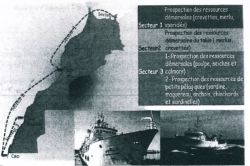
This research project intends to review different fisheries stocks. In practice, the Moroccan and Western Sahara waters are divided in three sectors for research-purposes. Sector one encompasses Morocco’s Mediterranean coastal waters and most of its Atlantic waters; sector two encompasses all of Western Sahara’s territorial waters and a small part of Morocco’s southernmost waters (from Sidi Ifni to the Western Sahara border); sector three is the southern half of Western Sahara’s waters.
Click on the map to the right to get a larger map, depicting the three different sectors.
Morocco has put the cost of this project at 40 MDH, or € 3,62 million. During the first year, Morocco used up 6,9 MDH (€625,000) of that 40 MDH.
There is no way of knowing how much of that money will be invested into research in Western Sahara.
16. Inventory, evaluation and classification of coastal resources (assumed as partly in Western Sahara, although not specified)
The Moroccan report cites “a lack of knowledge about nature and about the marine resources”, “the absence of a management plan for these marine resources” and want to take that on by developing an inventory system that would cost 40 MDH (€ 3,62 million). Between September 2014 and September 2015, Morocco used 6,9 MDH (€625,000) of that total amount.
17. Marine Observation with an operational oceanographic observation system (assumed as partly in Western Sahara, although not specified)
Morocco’s National Marine Research Institute (INRH) requires 12 MDH (€1,09 million) for an observation system to build up scientific knowledge about the marine resources in Moroccan (and occupied) waters. So far, INRH has spent 3,1 MDH (€280500) to this purpose.
18. Harmonizing operating systems (assumed as partly in Western Sahara, although not specified)
At the expense of 6 MDH (€543,000), Morocco’s National Marine Research Institute wants to harmonize the fish capacity and systems of its national fleet with the marine resources’ potential. To this purpose, it wants to take inventory of the fleet, study the used fish gear, and evaluate capacity of each fishing unit. So far, 1,7 MDH (€154,000) has been applied to the project.
19. Support of socio-professional associations (assumed as partly in Western Sahara, although not specified)
In return for 22 MDH (€2 million) the Moroccan government will sensitize “the populations” about sustainable fisheries.
Remarkably, Morocco’s report to the EU refers to the annual €1 million it received under the previous EU-Morocco fisheries protocol for the same purpose. Remarkable, because that money was never spent for this purpose. Moroccan fishermen organizations have brought an action before the Moroccan courts against two high placed civil servants of the Moroccan Ministry for Fisheries, who had divided the entire sum (€4 million for the 4-year duration of that previous Protocol) among themselves. Read more: Moroccan government accused of fraud with EU anti-driftnet money
It is impossible to deduce exactly how much of that money will go to socio-professional organisations in Western Sahara, but one thing is certain: it will not end up with Saharawi organisations. Morocco has a law that forbids the formation of associations or groups that have the objective of impairing the territorial integrity of Morocco. The Moroccan State views expressing views that are pro Saharawi self-determination as an act of undermining the territorial integrity. Through the years, well-known Saharawi activists have been handed prison sentences based on the accusation of attacking territorial integrity.
20. Obtaining 20 all-terrain vehicles for surveillance in the framework against IUU fishing (assumed as partly in WS, although not specified)
In order to fight IUU fishing (illegal, unreported and unregulated fishing), the Moroccan government is said to need 20 all-terrain vehicles for the price of 5 MDH (€453,000) that allow officers to check up on landed catches.
One might, of course, mention that all fishing in occupied Western Sahara can be considered as IUU fishing – as it is undertaken in violation of international law since Morocco, as an occupying power, has no right over Saharawi natural resources, and does not even possess the mere appearance of a rightful owner as it has never declared an Exclusive Economic Zone over the waters off the coast of Western Sahara.
Morocco dreams of new monster port in Western Sahara
Here is the EU Council's legal advice on fishing in occupied waters
Hans Corell criticizes EU fisheries in Western Sahara
The former Legal Counsel to the UN Security Counsel, Mr. Hans Corell, comments on the EU's fisheries activities in Western Sahara.
EU Court reaffirms position on Western Sahara
Polisario has a case, but it should be pursued when the time is right, Court implies.


